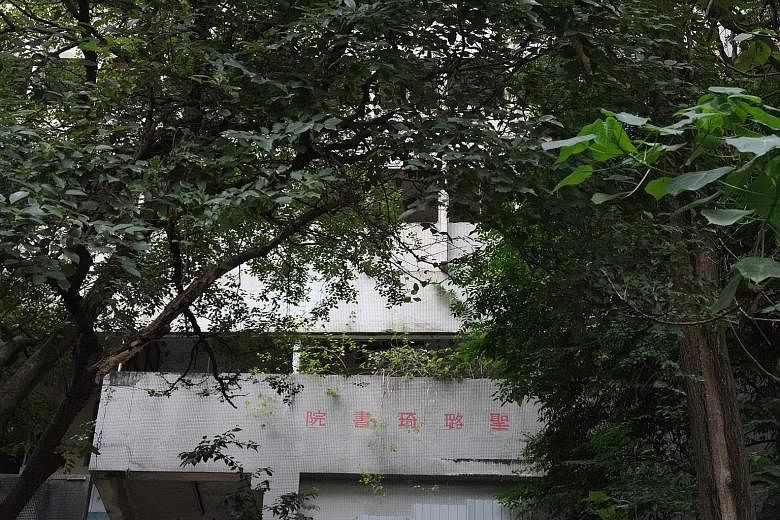In housing-starved Hong Kong, these are head-scratching sights:
More than 100 empty schools lying abandoned, some for more than a decade.
An estimated 65,000 residential units illicitly converted into commercial guesthouses for tourists.
Three-storey bungalows - some hugging the coastline, others with million-dollar views from hilltops, one for every "indigenous" male aged 18 and above, many of whom then go on to sell the right to build to developers. A further 932ha has been earmarked for this policy.
These are policy anomalies in Hong Kong, where the lack of adequate housing must count as its most disgraceful problem.

-
BAD NEWS FOR BUYERS
-
Private home price index in October (pegged to prices in 1990): 302.6. This is more than five times higher than the nadir in 2003.
Average home size: 480 sq ft
Number of years before one can afford a home (based on median home price and household income, with no other expenditure): 17
Number of applicants for public rental housing: 285,300
Average waiting time: 3 years 7 months
Number of new public rental units built in past year: 9, 938
Number of new public rental units in coming year: 23,100
SOURCES: HONG KONG RATING AND VALUATION DEPARTMENT; HOUSING AUTHORITY; DEMOGRAPHIA INTERNATIONAL HOUSING AFFORDABILITY SURVEY
Last month, the perennial crisis got some fresh airing, with the city's former and current leaders wringing their hands over how it can be resolved.
Chief Executive (CE) Leung Chun Ying floated the idea that country park land could be used to build flats. This came a day after former CE Tung Chee Hwa's think tank launched a slew of proposals.
It suggested that dwellers of future public flats be allowed to buy homes for a fixed price instead of at a price pegged to fluctuating market rates. It also called for a review of the "ecological value, service and use of country parks". In the long run, 80 per cent of the population should be owning their own homes, it said, up from 50 per cent or so at present.
In a closed-door briefing reported by the local media, Mr Tung expressed his sadness over a family's lament that a 170 sq ft flat now costs HK$3 million (S$541,000). "Society has to consider whether to allow citizens to live with respect, or to keep the country parks," he said.
But for Hong Kongers - a population of 7.2 million - the latest bout of noise from the ruling establishment will most likely amount to just that: noise.
While Mr Leung has - more so than his predecessors - sought to tackle the problem since becoming CE in 2012, the squeeze has yet to ease. While prices are beginning to soften - due to fears of an imminent United States interest rate hike - they remain stratospherically high.
On the supply side, the government is likely to fall short of its own target to build 290,000 public flats in the next decade, having secured enough land for just 254,000.
This is not a problem that powerful developers seem to face. With deep pockets and snaking networks, they continue to build luxury homes in a race to the skies and to smash records. Last month, a cool HK$500 million was dropped for a 5,400 sq foot apartment in Mid-levels, making it Asia's most expensive home sold.
One tempting solution is to scythe into Hong Kong's virgin land. Country parks and nature reserves cover 40 per cent of the territory's 1, 104 sq km.
But it is a controversial move, one opposed by environmental groups and nature lovers. Already, mindful of the backlash, Development Minister Paul Chan has stressed that the government would not touch country parks before its term ends in 2017.
Those against developing these sites counter that far better options exist. Contrary to the government narrative that more land is needed, one solution is to simply use already developed land more efficiently, said Professor Edward Yiu, associate director of Institute of Future Cities at Chinese University of Hong Kong.
In an embarrassing report released last month, government auditors found that 105 school premises have been lying fallow. Some, held by the Education Bureau, have been vacant for years and not returned to the government for land use reallocation.
Another option is to speed up the rezoning of brownfield sites - disused industrial land now used for scrap storage and workshops. The total size amounts to 1,600ha. Of these, just 20 per cent has been targeted for development. But the hurdle, said Dr Yiu, is the amount of land premiums for such conversions and how much to compensate the landlords.
But the most egregious is the so-called Small House Policy, an anachronistic hangover from the British colonial times.
Originally a government objective in 1972 to improve the conditions of village houses, it has since segued into an iron-clad entitlement for descendants via the male line of indigenous villagers in the New Territories, as of 1898, to build "small houses" close to their ancestral villages for, essentially, free.
A "small house" can go up to 700 sq ft - a mansion by Hong Kong standards - multiplied by three storeys. This has exacted a cost on the rest of society: There are now 642 recognised villages approved for such buildings.
Chief Secretary Carrie Lam had, when she was development secretary, sought to dismantle the policy but failed in the face of influential village leaders.
This state of affairs seems set to continue. Two weeks ago, quizzed about whether the government intends to review the policy in view of the pressing housing needs, Mr Chan said it recognises the need to do so. Yet, "such review will inevitably involve complicated issues in various aspects, such as legal, environment, land use planning and demand on land, all of which require careful examination".
In a sad indictment of the government's capability, he added: "The government has not come to a stance yet on any suggestions with regard to the policy."
Tackling all these shortcomings may not solve the city's housing problem at one fell swoop, but it will certainly go a long way.
Hong Kong's housing crisis is not intractable. There are potential solutions. The problem is the lack of political will.


